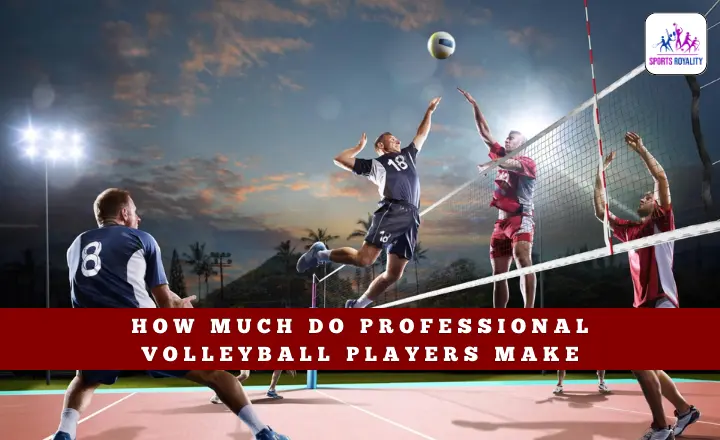If you’re a passionate player or an avid spectator, you might have wondered how much do professional volleyball players make for their incredible skills and dedication to the sport.
From the electrifying indoor matches of the FIVB World Championships to the sun-soaked sands of beach volleyball tournaments, these athletes propel themselves through intense training regimes and grueling competitions.
In this article, Join us as we explore the financial side of this thrilling sport and delve into how much do volleyball players make in their pursuit of glory on the court.
Is There A Professional Volleyball League?
It is a thriving sport worldwide, with over 20 professional leagues across the globe. While it may not be as globally recognized as soccer or basketball, volleyball has a passionate fan base and dedicated athletes competing at the highest level.
Europe is the primary hub for professional volleyball teams, boasting some of the most prestigious leagues. These leagues feature top-tier talent worldwide, with players honing their skills and battling it out on the court to claim victory.
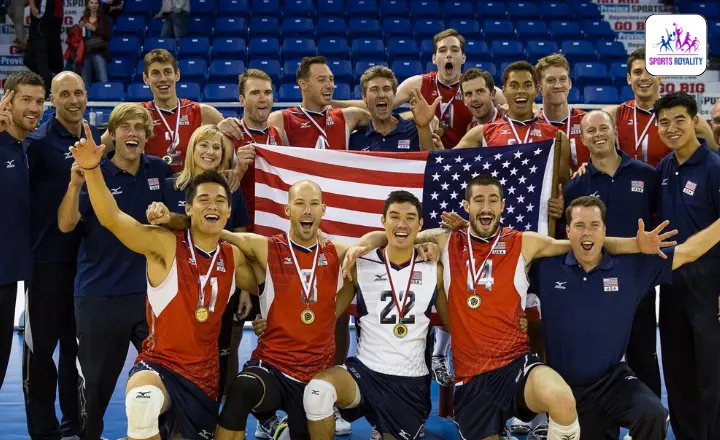
Asia also has a strong presence in professional volleyball, with powerful leagues based in different countries. The Chinese Volleyball League attracts international stars due to its high level of competition and impressive infrastructure.
Japan’s V.League showcases fast-paced gameplay coupled with passionate fans, creating an electric atmosphere during matches. South America should be noticed, too. Brazil’s Superliga de Volei is highly regarded globally for producing exceptional players who have succeeded at the club and national team levels.
What Factors Influence How Much Professional Volleyball Players Make?
The answer is always it depends, and salaries vary massively based on a few factors.
Foreigner Quota
In most volleyball leagues worldwide, there are restrictions on the number of foreign players a team can have on their roster, usually referred to as imports. This quota system aims to encourage the development of local talent and maintain a competitive balance within the league.
The impact of the foreigner quota on player salaries can be significant when a team has limited spots for foreign players; competition among clubs for top-level international talents increases.
These sought-after players have more negotiating power and can command higher salaries due to their scarcity in the market. This scarcity also creates opportunities for local players to secure larger contracts as teams invest in developing homegrown talent.
Foreigner Quota By Country
| Country | Quota |
| Germany | N/A |
| France | 6 |
| Italy | 4 |
| Poland, Turkey, Greece | 3 |
| Russia, China | 2 |
| Japan, Korea | 1 |
Skill Level
The higher the skill level, the more likely they are to secure contracts with top teams and earn lucrative salaries. Highly skilled players can command higher wages because they bring value to their team through exceptional performance on the court. They might possess superior technical skills, incredible athleticism, or an unmatched ability to strategize and lead their team.
Skill level also determines a player’s market value regarding endorsements and sponsorships. Companies are often drawn to athletes who consistently demonstrate outstanding skills and captivating performances. These endorsements provide additional income for professional volleyball players and increase their net worth.
European League Skill Tiers
| League | Tier |
|---|---|
| Italy, Russia, Brazil, Poland | 1 |
| Argentina, France, Turkey | 2 |
| Belgium, France B, Germany, Greece | 3 |
| Austria, England, Finland, Netherlands, Sweden, Switzerland | 4 |
Volleyball Position
Hitters and setters tend to earn higher salaries compared to other positions. These positions require high skill, athleticism, strategic thinking, and team coordination.
Hitters are responsible for scoring points by successfully attacking the ball, while setters play a crucial role in setting up plays and providing accurate passes to their teammates. Due to the demand for these skills, teams are often willing to invest more in players who excel in these positions.
Another factor that can influence a professional volleyball player’s salary is their level of experience and reputation within the sport. Players who have proven themselves at national or international levels or competed in prestigious leagues or tournaments may command higher salaries due to their importance and market value.
Players with extensive experience may also negotiate higher salaries based on their track record of success and consistency in performance. These factors affect an individual player’s earning potential and shape the overall salary structure within professional volleyball leagues worldwide.
How Much Do Professional Volleyball Players Make In Asia?
It varies greatly depending on the country, individual skill level, and market demand. Salaries for foreign players range from $15.5k to $55k per season. This may seem relatively low compared to the earnings of top athletes in other sports, but it is essential to consider the cost of living and economic conditions in these countries.
It’s worth noting that top local volleyball players can earn significantly higher salaries than their foreign counterparts. They may sometimes make up to $530k per season or even more.
This discrepancy often stems from the increased demand for skilled local players who have gained recognition and popularity among fans and sponsors.
Professional volleyball player salaries in Asia vary widely, with foreign athletes generally earning less than their local counterparts. It is essential to remember that monetary compensation is not the only factor that motivates these dedicated athletes.
They pursue their passion for the sport while gaining valuable experience playing against talented competitors worldwide within a unique cultural setting.
How Much Do Professional Volleyball Players Make In Europe?
Salaries vary depending on skill level, team success, and the hierarchy of European leagues; entry-level players can expect to earn between $13,000 and $100,000 per season. This range is quite broad because it encompasses various leagues with differing levels of financial investment.
Superstar players in Tier 1 leagues often command eye-watering salaries that can exceed $1 million per year. These exceptionally talented elite athletes generate substantial revenue through endorsements and sponsorship deals.

Such high earning potential highlights professional volleyball’s increasing popularity and marketability worldwide.
While these figures may seem remarkable to some, it is vital to understand that this income bracket does not represent all professional volleyball players in Europe.
Like any other sport, there is a vast spectrum within which player earnings fall based on factors such as experience, reputation, performance level, and the stability or competitiveness of their respective teams.
European Professional Volleyball Salaries By Country
| Country/League | Tier | Salary (USD) |
|---|---|---|
| Russia | 1 | $100k – $1m+ |
| Italy | 1 | $100k – $1m |
| Poland | 1 | $30k – $800k |
| Turkey | 2 | $30k – $600k |
| France | 2 | $30k – $500k |
| Argentina | 2 | $10k – $100k |
| Germany | 3 | $15k – $250k |
| Belgium, France, Greece | 3 | $15k – $150k |
| Austria, England, Finland, Netherlands, Sweden, Switzerland | 4 | $12k – $60k |
How Much Do Professional Volleyball Players Make In the USA?
Younger players on the team earn a modest income of $15,000 to $50,000 per year as entry-level professionals. While this may seem like a significant paycheck for many, it pales compared to the earnings of some more senior Team USA members who bring home over half a million dollars each year.
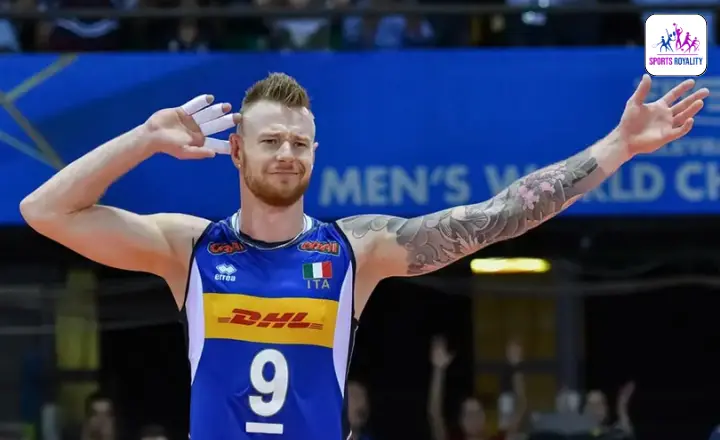
While these numbers are undoubtedly appealing, it is essential to consider factors such as endorsements and sponsorships. For seasoned players who have made a name for themselves within the industry, lucrative endorsement deals can significantly boost their overall income.
These partnerships allow athletes to work with major brands and companies and expand their influence beyond just their performance on the court. The reality is that not all volleyball athletes will reach this level of financial success during their careers.
How Much Do Professional Women’s Volleyball Players Make?
While it is true that most entry-level women’s professional volleyball players can expect to earn a modest salary between $10,000 and $25,000 per year, it should be noted that this figure can vary greatly depending on the country and league they play in.
Some players may not receive a guaranteed salary but earn money through appearances and sponsorship deals. More experienced athletes who have established themselves as top-tier players can enjoy more financial rewards.
For these seasoned professionals, salaries over $100,000 annually are not uncommon. Considering that this elite group represents only a tiny fraction of all volleyball players worldwide, it is essential.
How Much Do Professional Beach Volleyball Players Make?
On the lower end of the spectrum, entry-level players or those not performing at a top level can expect to make around $10,000 annually. Sponsorships and prize money from tournaments often supplement this.
Earnings can skyrocket for those who have succeeded in their careers and become well-known sports names. Top professional beach volleyball players have been known to earn millions of dollars annually through sponsorships with significant companies, appearances at prestigious events, and prize money from winning tournaments.
The highest earners in this sport have honed their skills and marketed themselves effectively to secure these lucrative opportunities.
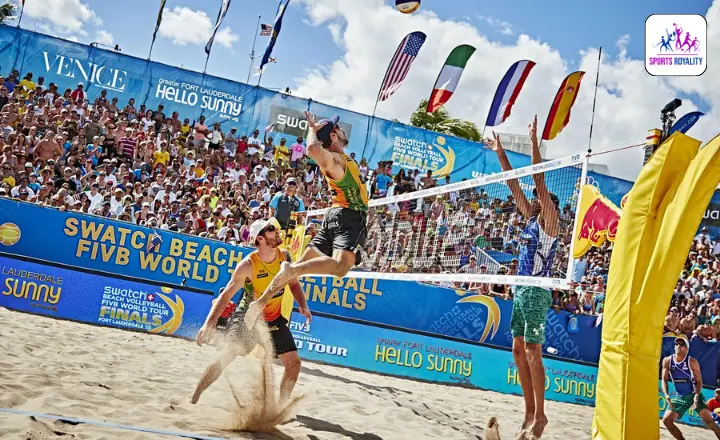
Are Professional Volleyball Players Rich?
Professional volleyball players are undoubtedly skilled athletes who have dedicated countless hours to perfecting their craft. While the sport has a different financial prosperity than basketball or soccer, top-tier volleyball players can still earn a comfortable living. It’s important to note that only a few make it to the top and experience substantial financial success.
A professional volleyball player’s wealth is their contract with their team or organization. The arrangements vary significantly depending on skill level, experience, and market value.
Top players often secure endorsements and sponsorships from well-known brands that provide an extra source of income. Tournament prize money can also contribute significantly to a player’s overall earnings.
Despite earning considerable amounts during their careers, professional volleyball players must be savvy in managing their finances for long-term stability beyond just a few seasons. Investing wisely is crucial to ensure future financial security.
Many players choose to invest in real estate or start businesses that align with their interests and expertise. These ventures serve as additional income streams even after retirement from the sport.
Who Is The Highest-Paid Volleyball Pro?
Wilfredo Leon is the highest-paid professional men’s volleyball player, who has taken the world by storm with his jaw-dropping skills and an impressive paycheck. The Cuban sensation recently made headlines by signing a massive $1.58 million contract with his club in Perugia, Italy.
Beyond his monetary success, Leon inspires aspiring young athletes worldwide, showing them that dreams can become reality with hard work and determination. Not only does he possess natural talent and physical prowess, but he also demonstrates unmatched dedication on and off the court.
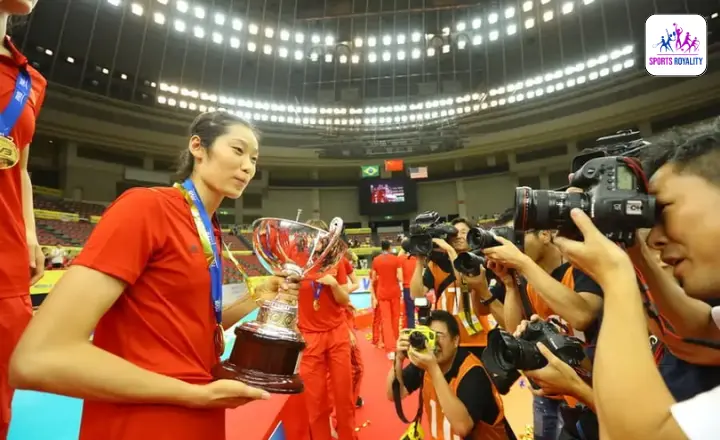
Whether through rigorous training sessions or meticulously studying opponents’ strategies, Leon exemplifies what it takes to reach the pinnacle of success in any sport.
Zhu Ting’s immense talent and skill on the volleyball court have undoubtedly paved the way for her to become the highest-paid women’s professional volleyball player. Hailing from China, Zhu Ting has proven herself nationally and internationally with numerous achievements.
In 2017, she played a pivotal role in leading the Chinese women’s national team to victory at the Rio Olympics. Her remarkable performance caught the attention of top clubs around the world.
While many may argue that such high salaries in professional sports are excessive, it is essential to recognize players like Zhu Ting’s impact on growing and popularizing the sport.
Volleyball enthusiasts worldwide can attest to how a dominant figure like her can captivate audiences and inspire future athletes. Zhu Ting’s success highlights the global nature of volleyball as she hails from China but thrives on the international stage, proving that talent knows no boundaries.
How Do Professional Volleyball Players Get Paid?
A significant source of income for professional volleyball players is through television rights. In Europe, where the sport is trendy, leagues can sell their TV rights to official sponsors who broadcast the games on television. This allows teams and leagues to generate revenue that can be used to pay their players.
Individual teams can secure endorsement deals that further contribute to player salaries. Like other sports athletes, professional volleyball players can partner with various brands and companies, promoting products and appearing in commercials or advertisements.
These endorsements provide an extra income stream for athletes and help them receive the financial compensation they deserve.
Conclusion
A question arises how much do professional volleyball players make? Because of that, volleyball continues to grow in popularity and profitability, which means more opportunities for players to earn significant salaries. The exact amount they make can vary depending on experience, skill level, and contracts with teams and sponsors.
Whether you’re an aspiring athlete or simply curious about the financial side of professional sports, understanding the earning potential of volleyball players can provide valuable insight into the industry.
FAQ’s
Are there any gender disparities in terms of salaries for professional volleyball players?
Male professional volleyball players tend to earn more than female players. This gap is gradually closing as women’s volleyball gains popularity and recognition.
Can international players earn higher salaries compared to domestic ones?
International players who excel in their respective leagues often have the opportunity to negotiate higher salaries due to their unique skill sets and ability to bring a different style of play to a team.

